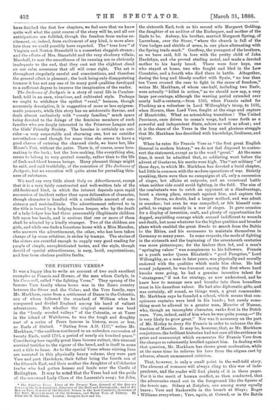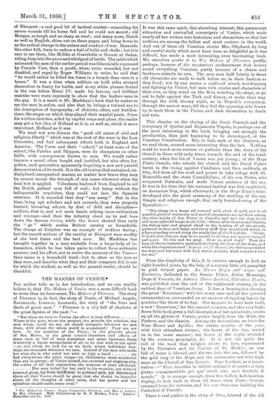THE FIGHTING VERES.*
Jr was a happy idea to write an account of two such excellent examples as Francis and Horace, of the men whom Carlyle, in his Cro m well, called "the fighting Veres." They sprang of the famous Vere family whose home was in the Essex country between the Stour and the Colne ; and the Vera family, says Mr. Markham, came from a settlement of Danes in the Cotentin, one of whom followed the standard of William when he conquered and divided England among his band of valiant adventurers. But whether the original warrior was bred in the "lovely wooded valleys" of the Cotentin, or at Veere in the island of Walcheren, he was the tough and doughty root of a series of Peers famous in history, more or less, as Earls of Oxford. "Dating from A.D. 1137," writes Mr. Markham, " the earldom continued in an unbroken succession of twenty Earls, until 1703, a period of nearly six hundred years." Considering how rapidly great lines become extinct, this unusual survival testifies to the vigour of the breed, and is itself in some sort a title to fame. As to the special Veres whose stirring lives are narrated in this physically heavy volume, they were part Vere and part Hardekyn, their father being the fourth son of the fifteenth Earl, and their mother the daughter of a Colchester trader who had gotten houses and lands near the Castle of Hedingham. It may be noted that the Veres had not the pride of the renowned Lady Clara of the Laureate's song ; for John, • The Fighting Veres. Lives of Sir Francis Vere, General of the Qoenfs Frt.:4 in the Low Count, lea, Governor of the Brill and Portsmouth ; and of Sir nor ,re Vero, Grn.ral of the Enalish Forces in the Low Countries, Governor of the Brill, Master-General of the Ordnance, and Baron Pere of Tilbury. By Clem: nts a. Markham. London : Sampson Low and Co. the sixteenth Earl, took as his second wife Margaret Golding, the daughter of an auditor of the Exchequer, and mother of the Earls to be. Aubrey, his brother, married Margaret Spring, of Lavenham, over the Stour, "where the church is full of the Vere badges and shields of arms, in one place alternating with the Spring trade-mark." Geoffrey, the youngest of the brothers, as we have said, fell in love with the pretty child of John Hardekyn, and she proved sterling metal, and made a devoted mother to his hardy brood. There were four boys, one who stayed at home, two who fought and bled in the Low Countries, and a fourth who died there in battle. Altogether, during the long and bloody conflict with Spain, "no less than ten Veres crossed the seas to fight in the cause of freedom," writes Mr. Markham, of whom one-half, including two Earls, were actually "killed in action," as we should now say, a very large per-centage, although the warring period extended over nearly balf-a-century,—from 1585, when Francis sailed for Flushing is a volunteer in Lord Willoughby's troop, to 1632, when Horace, then Lord Vere, fought at the siege and capture of Maastricht. What an astonishing transition ! The United Provinces, once driven to ocean's verge, had come forth as a powerful and independent State, ashore as well as afloat ; and it is the share of the Veres in the long and glorious struggle that Mr. Markham has described with knowledge, liveliness, and vigour.
When he rates Sir Francis Vere as "the first great English General in modern history," we do not feel disposed to contro- vert the statement, except as to the word "great." At the same time, it must be admitted that, as soldiering went before the advent of Gustavus, his merits were high. The "art military "of those days, to which Mr. Markham has devoted a lucid chapter, had little in common with the modern operations of war. Strictly speaking, there were then no campaigns at all, only a succession of sieges, hot affairs at outposts, and an occasional battle when neither side could avoid fighting, in the field. The aim of the combatants was to catch an opponent at a disadvantage, beset a strong place, entrench against him, and capture the town. Parma, no doubt, had a larger method, and was adroit in marches ; but even he was compelled, or felt himself com- pelled, to engage mainly in a war of sieges. It gave occasion for a display of invention, craft, and plenty of opportunities for dogged, unyielding courage which seemed indifferent to wounds and death, but none whatever for the higher qualities and broader plans which enabled the great Swede to march from the Baltic to the Rhine, and his successors to maintain themselves in Germany so many years. In some respects, the mode of fighting in the sixteenth and the beginning of the seventeenth centuries was more picturesque; for the leaders then led, and a man's "springing valour" was conspicuous to his followers. Francis as a youth under Queen Elizabeth's "good Peregrine," Lord Willoughby, as a man in later years, was physically and morally endowed with the qualities which made him shine. He had sound judgment, he was foremost among the first where hard knocks were going, he had a genuine inventive talent for "stratagems," if not for strategy, as now understood, and he knew how to manage men and breathe into them boundless trust in his dauntless valour. He had also diplomatic gifts, and was certainly, all round, as things went, a great commander. Mr. Markham says he founded a school, which means that con- spicuous captains were bred in his bands ; but surely some- thing must be allowed to a greater man, Maurice of Nassau, who, though an incomplete character, ranks first in the Dutch wars. Vere, indeed, said of him when he was quite young,—" He is very likely to grow great." Nor was it necessary on the part of Mr. Motley to decry Sir Francis in order to enhance the dis- tinction of Maurice. It may be, however, that, as Mr. Markham conjectures, the brilliant historian had not seen all the evidence in print and manuscript which exonerates Sir Francis Vere from the charges so vehemently levelled against him. In dealing with that question, Mr. Markham has shown great moderation, while at the same time he relieves his hero from the stigma cast by adverse, almost unmeasured criticism.
That, however, is only a small point in the well-told story. The element of romance will always cling to this war of inde- pendence, and the reader will find plenty of it in these pages. For it is the merit of human conflict, as then conducted, that the adversaries stand out in the foreground like the figures of the heroic age. Sidney at Zutphen, one among many equally brave ; Vere and Baskerville in the breach at Sluys ; Roger Williams everywhere ; Vere, again, at Ostend, or in the Battle
of Nienport—a real good bit of tactical combat—concealing his severe wounds till his horse fell and be could not mount; old Morgan, as tough and as sharp as steel ; and many more, Dutch as well as English, shine out on these pages, and bring home to us the radical change in the nature and conduct of war. Generals, like other folk, have to endure a hail of bolts and shells ; but it is rare to see them, like Moltke at Gravelotte or Ducrot at Sedan, riding deep into the press and whirlpool of battle. The spirit which animated the men of the earlier period was hibernically expressed by Francis Vere, then a youth, when, twice wounded, but not disabled, and urged by Roger Williams to retire, he said that "he would rather be killed ten times in a breach than once in a house." It was a time when soldiers on both sides arrayed themselves in finery for battle, and many white plumes floated in the van before Henri IV. made his famous, and brilliant mantles were worn expressly to show that the leaders were in the gap It is a merit in Mr. Markham's book that he makes us see the men in action, and also that he brings a trained eye to the description of topography, of districts, cities, and fortifica- tions, the stages on which they played their manful parts. From his written sketches, aided by capital maps and plans, the reader may get a fair idea of Holland as it is, as well as, which is more important, Holland as it was.
We need not now discuss the "good old cause of civil and religious liberty" which was at the root of the wars in the Low Countries, and had subsequent effects both in England and America. The Veres and their "school," at least some of the school, like Fairfax and Skippon, were its champions on other fields, with consequences known to men. We would rather impress a moral, often taught and justified, but also often for- gotten, each generation apparently requiring a new and painful demonstration of its truth. It is the old truism that untrained, un- disciplined, unorganised masses, no matter how brave they may be, cannot secure the triumph of any cause whatever when the final test is applied. Volunteers hastened from England to aid the Dutch, gallant men full of zeal ; but being without the indispensable requisites, they could not face the Spanish veterans. It is recorded that they "ran away." But in due time, being apt scholars and not cowards, they were properly trained, becoming adepts, by dint of drill and discipline— soldiers, that is, and not mere bands relying upon enthusiasm and courage--and then the infantry stood up to and bore down the famous tercios, while the horse showed thus early the " go " which makes British cavalry so formidable. The charge at Zutphen was an example of reckless daring ; but the superb actions of the cavalry at Nieuport were worthy of the best times and the best men. Mr. Markham has brought together in a very readable form a large body of in- formation, which be has taken pains to collect from authentic sources; and his effort, not to revive the memory of the Veres- their name is a household word—but to show us the men as they were, and describe what they and their compeers did, is one for which the student, as well as the general reader, should be thankful.



































 Previous page
Previous page